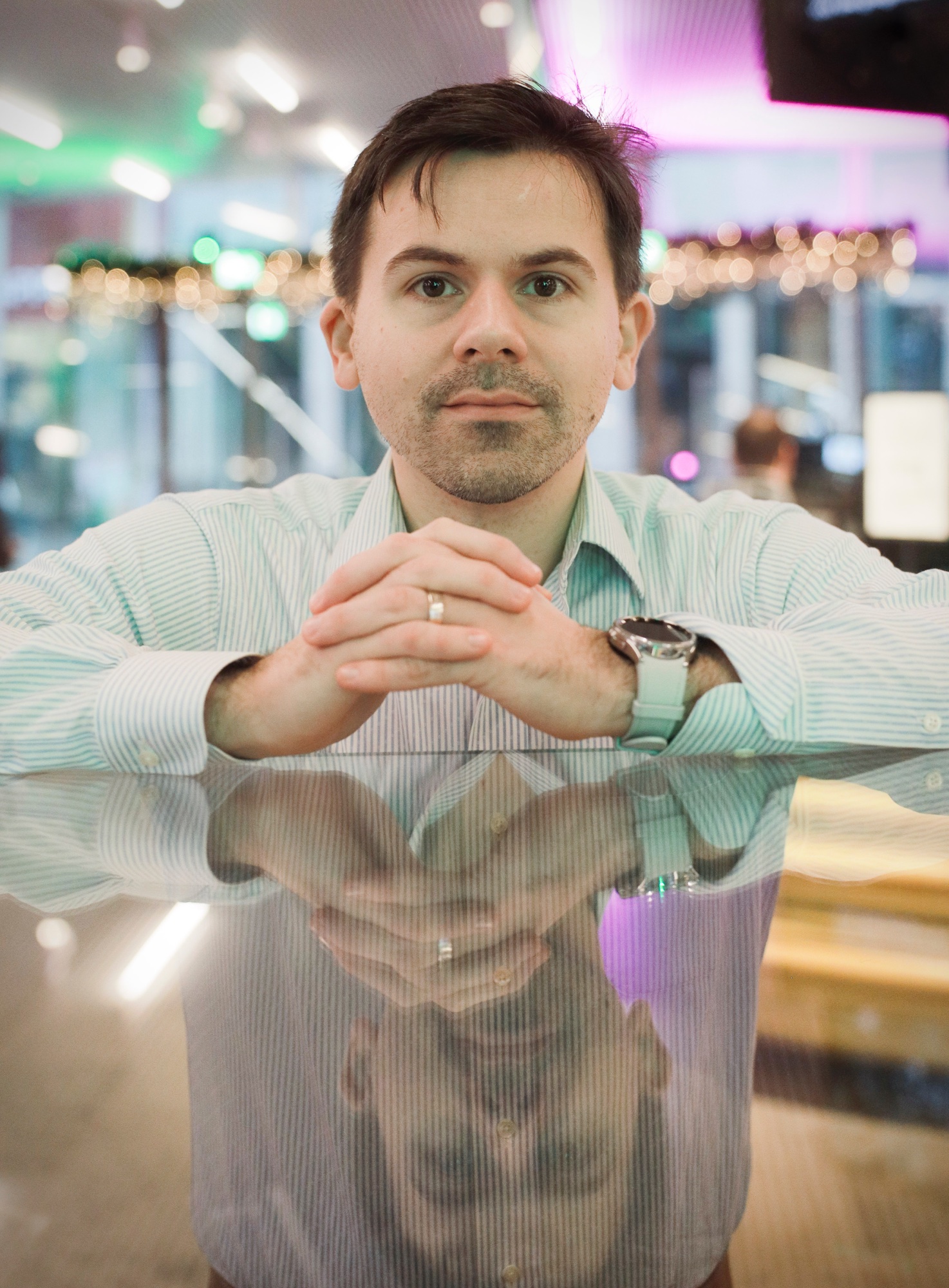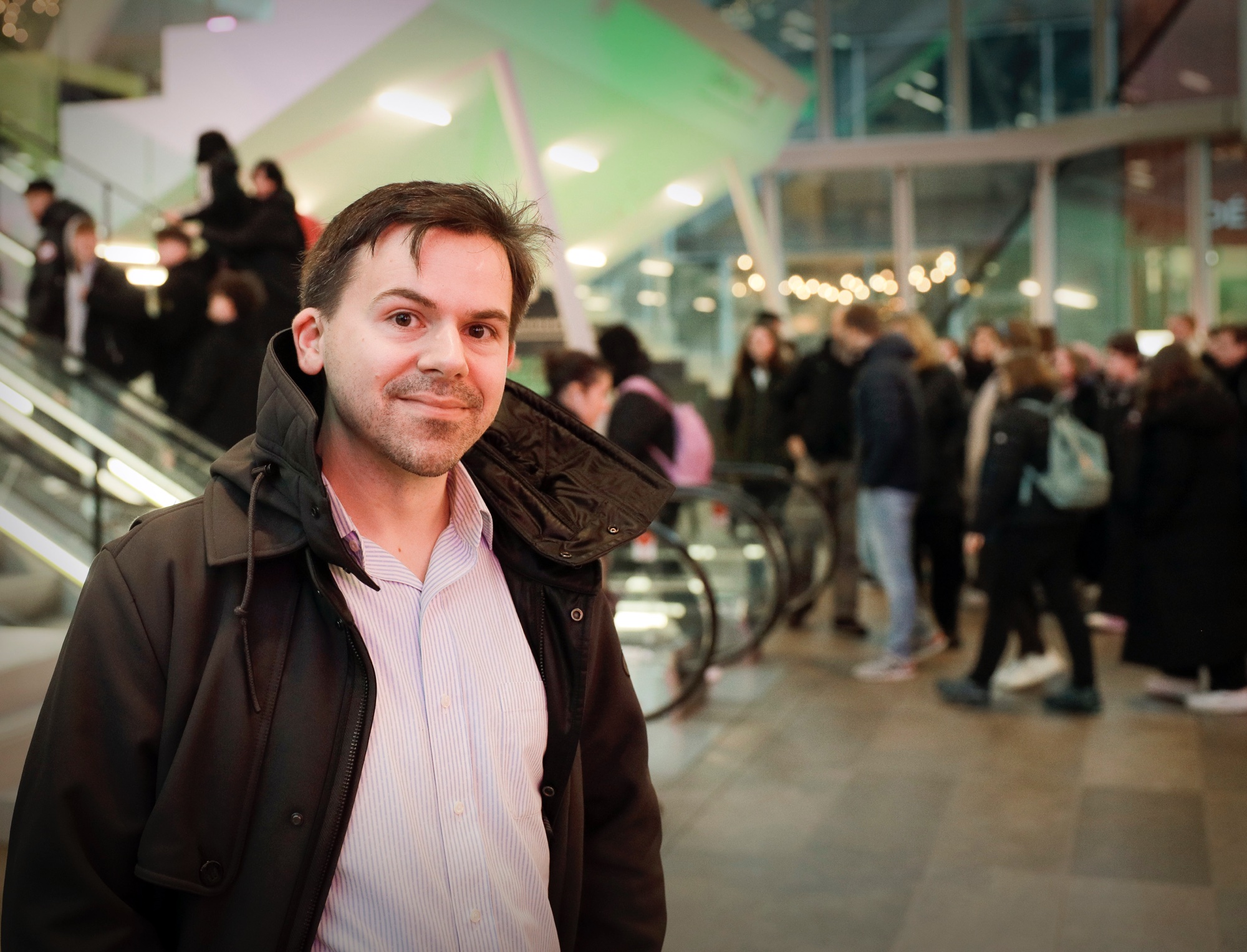What can ‘Europe’ learn from its citizens?
What are the consequences of the coronavirus pandemic and the implemented measures for citizens’ trust in politics and science? What lessons can policymakers in Europe and elsewhere draw from this to tackle a potential next pandemic? Dr Benjamin Leruth, researcher and assistant professor at the Faculty of Arts, researched these questions in five European countries. He uses so-called citizens’ juries, small groups of engaged citizens that hold discussions and make recommendations to national and European political bodies. ‘Policymakers should have structural discussions with citizens about important political themes.’
Text: Theone Joostensz | Photos: Henk Veenstra

Do you remember, in times of corona, that we thought the world had changed for good? We were only ever going to work from home, never fly again, and never shake hands again. By now, we are all happily stuck in traffic on our way to work and we are all boarding planes again. We have gone back from the new normal to the regular normal again. Still, the world has changed compared to the pre-corona era. ‘The coronavirus pandemic worked like a catalyst for the spread of disinformation, which led to a growing sense of distrust towards government bodies’, says Benjamin Leruth. 'The advance of fake news and a growing lack of trust in the government was already happening, but the pandemic put these issues under a magnifying glass. This fact, plus the complex information about the vaccines and the how and why of particular measures, such as face masks and lockdowns, made it even more complicated to manage the pandemic.’
Disinformation is a major issue
In his research, Leruth focused on five European countries: the Netherlands, Germany, France, Poland and Italy. He used citizens’ juries, small groups of engaged citizens of varying social and educational levels that convened in their own countries to discuss important themes with the aim of making recommendations to policymakers in Europe and elsewhere on how to tackle a potential next pandemic. The citizens’ juries discussed four main questions: How was scientific knowledge handled during the pandemic? How did they experience disinformation and how can it be combated? What was the role of non-elected experts in policymaking? (In the Netherlands, these experts were members of the OMT (Outbreak Management Team), but also people who, for example, joined a talk show and determined the public opinion.) What is the state of trust in political institutions?
‘The citizens’ juries of all countries indicated that disinformation is a major issue and that the government is not doing enough to stop it from spreading’, says Leruth. ‘The countries came up with various proposals on how to deal with disinformation. Germany pleaded to professionalise science communication by establishing a council of experts. The Dutch citizens’ jury recommended an official communication channel to be used by independent journalists and academics to inform citizens. The French preferred this to be taken care of at a European level and suggested creating a label for news websites that are approved by Brussels. Italy and Poland recommended a focus on more and better education, so that people are better able to recognise fake news. In addition, Italy indicated that the uncertainty and the novelty of the situation made for unclear communication. Italy was, of course, one of the first countries that had to deal with the pandemic, which traumatised the population. For that reason, disinformation is seen as one of the most prominent issues there.’
Sceptical citizens’ jury
In the Netherlands, transparency about policy decisions and the people making these decisions is high on the list of recommendations. ‘The lack of access to information about the backgrounds of experts in the OMT, the lack of transparency about their role and position, and the fact that decisions were being made behind closed doors all contributed to the sense of distrust among some groups. More transparency and clarity about the reason for particular measures, such as lockdowns, would also have been appreciated.’
Leruth also noticed that the Dutch citizens’ jury was initially quite sceptical about the study. ‘People asked me, for example: why was I selected? Or: are they actually going to listen to us? They were very direct and critical. I frequently use citizens’ juries in my research but I had never experienced this before.’ He gives a tentative explanation for this scepticism: ‘The Dutch participants’ trust in politicians was not very high, and in that sense, it is logical that they did not fully trust the study either.’ All is well that ends well, though: ‘By the end of the experiment, every single one of them was positive.’

Gap between citizens and politicians
There is one more thing that the citizens’ juries have in common: all countries realised that there is a growing gap between citizens and politicians. Citizens are far removed from policymakers and people often do not feel heard. This can lead to distrust and a growing influence of radical parties. The countries made recommendations to tackle this. They pleaded for citizens having more say in the decision-making process and that this should also be formalised. Leruth: ‘They pleaded for more dialogue among citizens, between citizens and politicians, between citizens and experts. The participants in citizens’ juries could also actually have a conversation with experts, which was highly appreciated. Some participants also asked the experts about their personal experiences with the pandemic, which resulted in true person-to-person conversations.
Follow-up in Brussels
Leruth’s study – the results of which can be found on the project website – will have a follow-up in March. A delegation of all five citizens’ juries will gather in Brussels to present their recommendations, have discussions with one another, and share their experiences. ‘We have also invited experts and politicians from the European institutions to this meeting’, says Leruth. ‘To my knowledge, this is the first time that we are organizing such a multi-level citizens’ jury with participants of so many different cultural, social, linguistic, and political backgrounds. Will they be able to share their experiences about such a delicate subject and reach consensus in order to make joint recommendations with the input of European experts and European politicians?’
Leruth is a supporter of more research involving citizens’ juries. ‘As citizens, we all have a role in society. Our research shows that when citizens are handed a microphone, they want to use it. It is important that people are not afraid to express their perspectives, worries, and criticism. By sharing this and by discussing it together on various levels is exactly how we can improve ourselves and influence policy. The whole society benefits from that.’
REGROUP projectBenjamin Leruth’s research with citizens’ juries is part of a large European study called REGROUP, which stands for ‘Rebuilding governance and resilience out of the pandemic’. This project, led by Dr Piero Tortola of the Faculty of Arts of the UG, is concerned with the sociopolitical consequences of the coronavirus pandemic in Europe. Research is conducted into themes such as the coordination and cooperation within the EU during the pandemic, how democratic values were safeguarded and threatened, and the consequences of the pandemic for political trust. Around 70 researchers, spread across 14 universities and think tanks in the whole of Europe, collaborate on this three-year study that is coordinated by the UG. At the end of the term, the researchers hope to have clarified which lessons can be drawn from this pandemic and how European policymakers can better prepare themselves for a potential next pandemic. The REGROUP project is funded by Horizon Europe. |
| Last modified: | 19 September 2024 1.25 p.m. |
More news
-
25 November 2024
Liekuut | Give young people a cultural hangout spot and a voice
Young people know very well what they would like to see and hear culturally, but that is not always reflected in the programming of cultural institutions yet. According to Johan Kolsteeg, Assistant Professor of Art and board member of the Groningen...
-
08 October 2024
Tracking the tongue
Thomas Tienkamp and Teja Rebernik explain how fundamental research on articulation could help explain speech disorders and may contribute to the recovery of people with speech disorders in the future.
-
08 October 2024
Passion for sustainable fashion
Chilean journalist María Pilar Uribe Silva has dedicated half her life to making the clothing industry more sustainable. This summer, she started a PhD project at the RUG. ‘I think it is possible, a more just and sustainable clothing sector. What...
